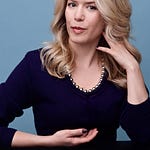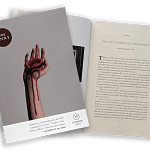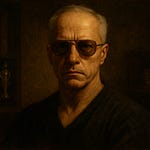Episode Reading List:
From Queer to Gay to Queer, James Kirchick
How Hannah Arendt’s Zionism Helped Create American Gay Identity, Blake Smith
When the Pope Hits Your Eye Like a Big Pizza Pie, That’s Ahmari, James Kirchick
Eve Kosofsky Sedgwick’s Big Fat Nonbinary Mistake, Blake Smith
Are Conservatives the New Queers?, Blake Smith
Wesley Yang, The Souls of Yellow Folk, John Pistelli
I have a working hypothesis that no one has suffered a more dramatic decline in a certain kind of social status, as a result of changes in left-liberal elite culture and politics, than white gay men. Less than a decade ago they were at the vanguard of social progress, having led a gay rights movement that achieved an extraordinary series of legal, political, and cultural victories. Now they're perceived as basically indistinguishable, within certain left-liberal spaces, from straight white men. In some activist circles they may be even more suspect, since they're competing for leadership roles and narrative centrality where straight men wouldn't presume (or particularly desire) to tread.
My hypothesis, if it's accurate, is interesting on its own terms, as part of a much longer history in America of ethnic and other minority groups rising and falling in relative cultural, intellectual, and literary status. It's also interesting, however, for what it tells us about the recent evolution of left and liberal politics, as they've shifted and reshaped themselves in reaction to both great victories, like the legalization of gay marriage, and to depressingly intractable problems like the persistent racial gaps in wealth, health, incarceration, and crime.
I’m less interested in the justice or injustice of this shift in standing (though I’m somewhat interested) than I am in the facts of it and its implications. Why has it happened? What does it feel like for the people who have experienced it? What are its implications? Will there be a backlash? To assist me in thinking through what it all means, I invited to the podcast Blake Smith and Jamie Kirchick.
Jamie is a columnist for Tablet magazine, a writer at large for Air Mail, and the author of last year’s New York Times bestseller, Secret City: The Hidden History of Gay Washington. He has long been an outspoken critic of some sectors of the gay left and what he perceives of as their desire to subordinate the project of achieving full civic and political equality for gay people to a more radical, revolutionary project to tear down conventional bourgeois ideas of gender, sexuality, marriage, family, monogamy, and identity. In a recent essay in Liberties, “From Queer to Gay to Queer,” Jamie compares the liberal tenets of the gay rights movement to the radical aspirations of what he calls “political queerness”:
With its insistence that gay people adhere to a very narrow set of political and identitarian commitments, to a particular definition that delegitimates everything outside of itself, political queerness is deeply illiberal. This is in stark opposition to the spirit of the mainstream gay rights movement, which was liberal in every sense — philosophically, temperamentally, and procedurally. It achieved its liberal aspirations (securing equality) by striving for liberal aims (access to marriage and the military) via liberal means (at the ballot box, through the courts, and in the public square). Appealing to liberal values, it accomplished an incredible revolution in human consciousness, radically transforming how Americans viewed a once despised minority. And it did so animated by the liberal belief that inclusion does not require the erasure of one’s own particular identity, or even the tempering of it. By design, the gay movement was capacious, and made room for queers in its vision of an America where sexual orientation was no longer a barrier to equal citizenship. Queerness, alas, has no room for gays.
The victory of the gay movement and its usurpation by the queer one represents an ominous succession. The gay movement sought to reform laws and attitudes so that they would align with America’s founding liberal principles; the queer movement posits that such principles are intrinsically oppressive and therefore deserving of denigration. The gay movement was grounded in objective fact; the queer movement is rooted in Gnostic postmodernism. For the gay movement, homosexuality was something to be treated as any other benign human trait, whereas the queer movement imbues same-sex desire and gender nonconformity with a revolutionary socio-political valence. (Not for the first time, revolution is deemed more important than rights.) And whereas the gay movement strived for mainstream acceptance of gay people, the queer movement finds the very concept of a mainstream malevolent, a form of “structural violence.” Illiberal in its tactics, antinomian in its ideology, scornful of ordinary people and how they choose to live, and glorifying marginalization, queerness is a betrayal of the gay movement, and of gay people themselves.
In the podcast I refer to Jamie as “a man alone.” This isn't quite true. He has comrades out there, in particular older gay writers like Andrew Sullivan and Jonathan Rauch, who share many of his commitments and critiques. Generationally, however, Jamie seems more alone than they do, without a cohort of gay intellectuals of roughly his age who share his intellectual reference points, his liberalism, and his very specific experience of coming of age as a gay man and journalist in America when he did, at his specific point of entry to AIDS, the decline of print and rise of online journalism, and the political advance of gay (and more recently trans) rights.
He’s a man alone but also, if the premise of this podcast is accurate, a man alone who has been publicly articulating a set of feelings and arguments that is shared by many of his gay male peers, of various generations, but hasn’t yet taken shape in the form of a political or intellectual reaction.
Blake Smith is my first return guest to the podcast, having recently joined me to discuss Pulitzer Prize-winning essayist and critic Andrea Long Chu (the “it girl of the trans world,” as I called her). He is a recent refugee from academia, now living and working as a freelance writer in Chicago, writing for Tablet magazine, American Affairs, and elsewhere. At 35 he is only a few years younger than Jamie, but is the product of a very different set of formative biographical and intellectual influences. Raised in a conservative Southern Baptist family in a suburb of Memphis, Blake’s big coming out, as he tells the story, was less as a gay man than as the kind of academically credentialed, world-traveling, city-based sophisticate he has become.
If Jamie’s sense of loss is maybe something in the vicinity of what I proposed at the top of this post–that he went from being in the ultimately victorious mainstream of the gay rights struggle to being seen as a member of the privileged oppressor class, at best a second-class “ally” and at worst an apostate to the cause –than Blake’s experience is less about any personal or political loss of status or standing than it is a variant of the venerable intellectual and literary tradition of pining for a scene or scenes from eras prior to your own. Think Owen Wilson’s character in Woody Allen’s Midnight in Paris, who was magically transported back to Paris in the 1920s, the scene he’d always romanticized, only to fall in love with a woman from that era who herself romanticizes and eventually chooses to abandon him for another, earlier cultural moment, the Belle Époque scene of the 1890s.
For Blake, the key era, maybe, was the brief post-Stonewall period before AIDS superseded all other concerns––so the 1970s, more or less– when gay male life was sufficiently out of the closet for a gay male public to come into existence and begin to define itself and understand how it related, or didn’t relate, not just to the straight world but also to feminism, women, Marxism, black civil rights, and other left-wing and liberal movements. In a recent piece in Tablet, Blake writes about the magazine Christopher Street, founded in 1976, and its project of helping to bring into existence a coherent intellectual and cultural community of gay men:
In its cultural politics of building a gay male world, Christopher Street featured poetry and short stories, helping launch the careers of the major gay writers of the late 20th century, such as Edmund White, Andrew Holleran, and Larry Kramer. It also ran many essays that contributed to an emerging awareness that there was a gay male canon in American letters, running from Walt Whitman and Hart Crane to John Ashbery and James Merrill.
Christopher Street was by no means the only venue for the construction of a gay world, but [editor Michael] Denneny and his colleagues were perhaps the sharpest-minded defenders of its specificity—their demand that it be a world for gay men. In a debate that has now been largely forgotten, but which dominated gay intellectual life in the 1970s, Denneny’s Arendtian perspective, with its debts to Zionism, was ranged against a vision of politics in which gay men were to be a kind of shock force for a broader sexual-cum-socialist revolution.
For Blake, what’s been lost or trumped is less the liberal politics that Jamie champions and that Christopher Street more or less advocated than the existence of a gay male world of letters that had fairly distinct boundaries, a relatively private space in which gay men–who may always remain in some way politically suspect, even reviled, by the mainstream–can recognize and talk to each other. As he writes in another recent essay in Tablet, maybe half-seriously, “One should, …know one’s own type (Jew, homosexual, philosopher, etc.) and remain at a ‘playful distance’ from those outside it, with ‘no expectation of essential progress’ toward a world in which the sort of people we are can be publicly recognized and respected. No messiahs, and no end to paranoias and persecutions—but, in the shade of deft silences, the possibility of cleareyed fellowship with one’s own kind.”
Jamie, Blake, and I had what I found to be a really exciting conversation about all these issues and more. Give it a listen.

















Share this post